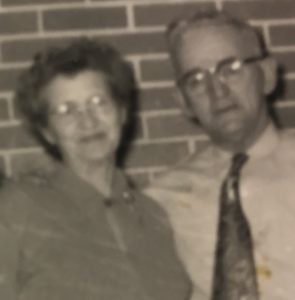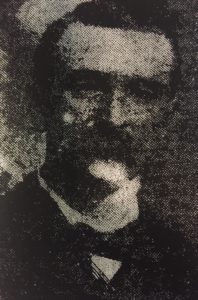My second mother –my Dad remarried on Feb. 24, 1949, about 20 months after my first mother died — had gone upstairs to take a bath when I heard a knock on the front door of the farmhouse where we lived, outside Gadsden, AL.
Mother and I had spent the evening playing Canasta. Dad and Brother Dave had gone to a father-son event, the only time I remember my Dad ever doing something like that. He wasn’t that kind of father.
I answered the door, which wasn’t locked, didn’t even have a lock. A man was standing on the porch and he asked me, “Is your Daddy at home?”
“No sir,” I said.
He asked if he could come in and wait on him and I said, “Yes sir.”
I led him to the back living room and he sat down in my Dad’s chair. I had never seen him before but I knew right then he must not know my Dad very well or he would not have sat in his chair. No one sat my Dad’s chair.
“Who else is here?” he asked.
I said just my mother – she’s taking a bath upstairs — and me. I had forgotten that my brother, Pop, who was 16 or 17 years old and good at fighting, was also upstairs, asleep.
“Just you, your mother, and me,” he said.
And I said, “Yes sir.”
“Go out to my car and get my keys.”
I went outside to his car, parked in our driveway. It smelled like alcohol. I got his keys and went back into the house. He was still sitting in Dad’s chair.
A few minutes later my mother came down the stairs, wearing a green, ankle length robe, and when she saw the man, she stopped on the stairs and told him to leave.
He hesitated and she told him again, “Leave right now!” and he did.
Mother was still shaking when my Dad got home and she told him what had happened.
He was furious.

My father was a man who took offense easily and liked to fight. He had a blackjack and brass knuckles, which I saw once on the nightstand beside their bed. He had a pistol, too.
He began questioning mother and me.
What did this guy look like? How was he dressed? What kind of car was he driving? What color was it? What, exactly, did he say? Exactly.
And then Dad got on the phone and he started calling people he knew, friends, some of them. Other people too, questioning them. He knew men who lived on the edge of the law, bootleggers, gamblers.
And finally he found the man –I don’t know how– and he got him on the phone.
I heard Dad say, “Get a gun! I’m coming to see you. I’m going to shoot you, and I don’t want it to be murder.”
The man must have said, “You don’t know I look like,” or words to that effect because my Dad replied: “I got a boy who knows what you look like. He going to point at you and I’m going to shoot you.”
I was eight or nine years old.
Continued tomorrow.
